Have you received a notice from your hosting provider about upgrading to a new version of PHP and are wondering what it means for your website?
WordPress is written in the PHP programming language. It is a server-side language, which means it runs on your web hosting server to dynamically generate WordPress pages.
In this article, we will explain how PHP updates by your web host impact your WordPress sites. We will also discuss the things you can do to avoid any conflicts or downtime on your website.
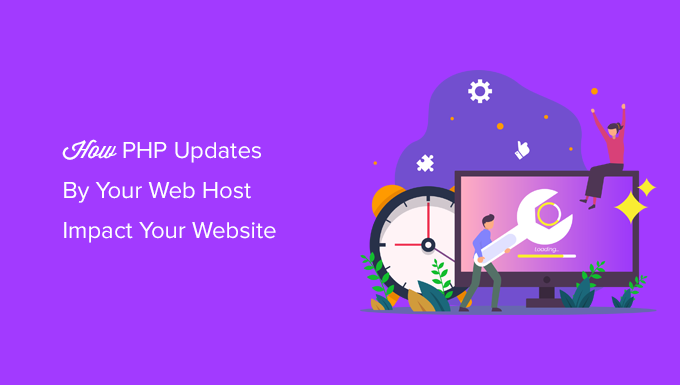
WordPress and PHP Updates
WordPress is developed using an open-source programming language called PHP. At the time of writing this article, WordPress requires at least PHP version 7.4 or greater. The current stable version available for PHP is 8.3.
Most shared hosting providers currently offer PHP version 7.4 or greater, and you can update or downgrade it from your hosting control panel.
You can see which PHP version your website is using by going to the Tools » Site Health page and switching to the ‘Info’ tab.
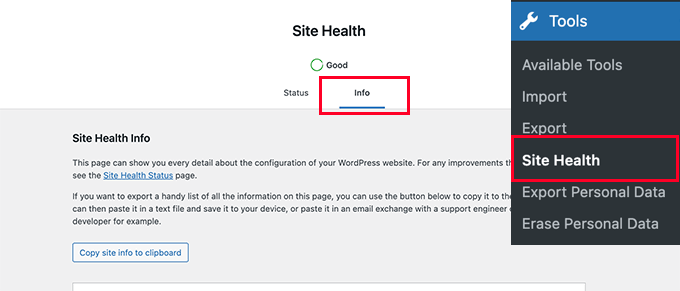
Next, you need to scroll down a little and click to expand the ‘Server’ tab.
This section shows server information including the PHP version used by your server.
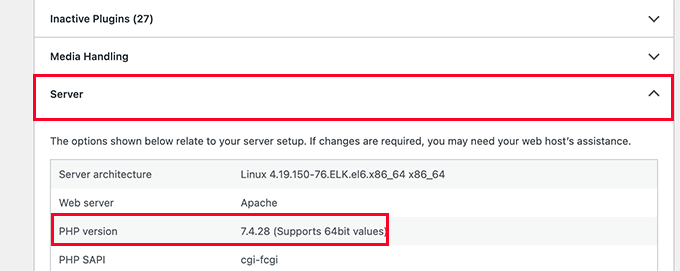
Note: If this section is showing anything below PHP 7.4, then you need to update your PHP version.
Why Don’t Hosting Providers Use the Latest Version of PHP by Default?
Web hosts often avoid using the newest stable versions of PHP because these versions can occasionally cause compatibility issues with PHP applications such as WordPress.
However, they also don’t want to stay far behind. Currently, PHP 7.4.+ is the minimum required version, and PHP 8.0+ is generally recommended.
A PHP update initiated by your web host is supposed to go smoothly, but it can also go terribly wrong. It all depends on your web host and how they configure their servers.
This is why we recommend choosing top-tier WordPress hosting, as it ensures that highly skilled engineers are maintaining those servers.
Bluehost, Hostinger, and SiteGround are the most popular, reliable web hosting services that support PHP versions 7.4 or higher to meet the minimum WordPress requirements.
Choosing an unreliable web host for your WordPress site can cause unexpected downtime during or after the update, and there is pretty much nothing you can do about it except switch to a better host.
Things You Need to Do When Your Host Updates PHP
Your web host is probably already hosting thousands of WordPress sites. They will take every precaution they can to make sure that everything goes smoothly and customers don’t feel any glitches in the service.
The notice you have received allows you to be informed about the update and keep a lookout to see if anything goes wrong.
Although it is unlikely that this update will break things, it is always good to be prepared and ready.
Following are a few things you can do to prepare for the update.
1. Make a Complete WordPress Backup
First of all, we always recommend our users regularly back up WordPress sites. If you do not have an automatic backup solution already, then see our list of the best WordPress backup plugins to choose one.
We recommend Duplicator. It allows you to easily create scheduled backups and safely store them on popular cloud services like Dropbox, Google Drive, and more.
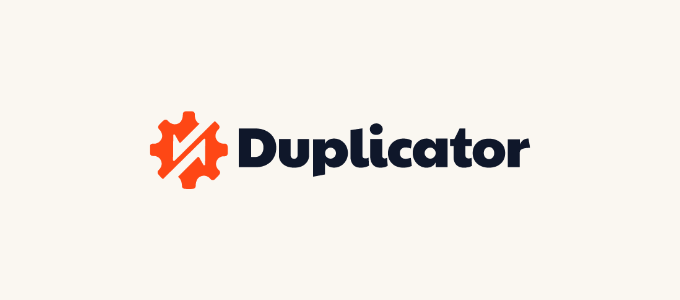
There’s also a free version of Duplicator you can use to get started.
You can also manually back up the WordPress database and download all your website files using FTP.
2. Install WordPress Updates
After backups, the next thing you need to do is to make sure that you are running the latest version of WordPress. Also, make sure to update your plugins and themes.
To do so, simply go to the Updates screen and install any updates available.
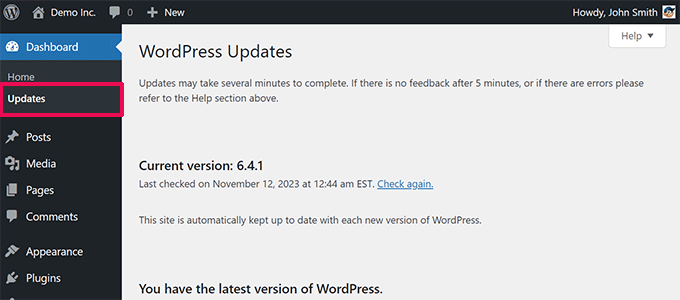
WordPress itself and most popular WordPress plugins will not be affected by PHP updates. However, some plugins may stop working.
If a plugin on your site has stopped working due to a PHP update, then you need to contact the plugin author for support or find an alternative.
What to Do if a PHP Update Breaks Your WordPress Site
There is very little chance that a PHP update will break your WordPress site. However, with the abundance of free and paid plugins, a single line of poor code can result in any of the common WordPress errors.
The first thing you need to do is make sure that it is not a plugin or theme causing this error. To do that, you can deactivate all your WordPress plugins and switch to a default WordPress theme.
If this doesn’t resolve your issue, we suggest contacting your web host’s support team. They are likely already aware of the problem and can provide the necessary assistance.
If your web host is unable to help you out, then try to install a fresh copy of WordPress and then restore your WordPress site from backup.
If none of this helps, then perhaps it is time to change your WordPress hosting.
We hope that this guide helped you understand how PHP updates by your web host impact your WordPress site. You may also want to see our WordPress site health guide or see our tutorial on keeping your WordPress site secure.
If you liked this article, then please subscribe to our YouTube Channel for WordPress video tutorials. You can also find us on Twitter and Facebook.





Syed Balkhi says
Hey WPBeginner readers,
Did you know you can win exciting prizes by commenting on WPBeginner?
Every month, our top blog commenters will win HUGE rewards, including premium WordPress plugin licenses and cash prizes.
You can get more details about the contest from here.
Start sharing your thoughts below to stand a chance to win!
Moinuddin Waheed says
updating to the latest version of php may cause to break the website and cause several other problems.
I have faced this issue and asked my hosting provider to update it for me. This solved the issue .
Thanks wpbeginner for bringing this to our attention. This is really a very serious cause of concern for many who gets in trouble by updating php version without taking backup or other considerations.
Rosemary Lafferty says
Excellent explanation, thank you
WPBeginner Support says
You’re welcome, glad our guide was helpful!
Admin
Rafal says
I don’t understand. I have notice on dashboard “PHP Update required”. You wrote above “This is why we recommend our users to choose the best WordPress hosting, so they know that there are top-notch engineers who are looking after those servers.”. I have bluehost, top one recommended by you. And what next?
WPBeginner Support says
If you reach out to their support they can update your PHP for you. Hosts will set you up with the up to date versions of PHP but they don’t always update the PHP without you reaching out to ensure nothing is broken on your site should you still need to use an older version of PHP.
Admin
Miley Cyrus says
Interesting article….
WPBeginner Support says
Thank you
Admin
Rozina says
Thanks for such useful articles by your excellent editorial staff.
I would really appreciate if you could let us know as to which PHP handler is being used on this website – Really impressive that WPB loads fast even with such high traffic.
As per info available on this topic DSO is supposed to be faster than suPHP, but it is really unclear as to how fast DSO is in comparison to suPHP (secure, stable and works well with wordpress).
Wolfgang says
This is an important criterion for a beginner with a limited budget who has so many starting expenses. But it should not be the main guiding force. In the long run, cheap may not necessarily be the most economical. If the level of services is good then a little investment will pay for itself through better performance. Look for web hosting plans offered by affordable companies which provide quality with reasonable rates for web hosting.
Roger says
Perfect timing; I just got that same email a couple weeks ago. BTW, I’ve started referring my clients to your website for tutorials. Fantastic content .
Thank you.
Helen says
Do you have a current article on good hosting? Your archived article from 2009 is outdated and recommends host gator!
WPBeginner Support says
Yes we still recommend HostGator.
Admin
Carole Rains says
The PHP update by Bluehost broke the checkout page on my WordPress site. Items added to the cart did show up in the cart page at checkout, but the cart icon in my header said the cart was empty. In addition, when the button for “enter credit card info” is clicked, it triggers an error message that says invalid shipping method. Bluehost agreed to switch me back to PHP 5.2 temporarily, but said at some (undetermined) point in the near future they will switch to the new version regardless.
Any suggestions on how I can fix this?
Marilyn Lesniak says
When I updated my pho to the newest versuon, I only got 1 problem. When I open posts and click on tags I receive this message.:
How do I fix this? Thx!
Jan Reilink says
(as sent via Twitter)
It’s not PHP updates that break WordPress websites or plugins. It’s not updating WordPress (or plugins) that breaks when PHP is updated… BTW, the WordPress core and most plugins I use run perfect with PHP 5.5.
Most hosting providers will keep an older PHP version available for customers to temporarily switch back to when something goes wrong. Where I work, 5.4.* is the default and both 5.5* and 5.3* are available. Version 5.3 until PHP drops the support for security updates.
So, always check with your hosting provider first if that is possible before getting angry with your hosting provider…
For as far as I know, a lot of hosting companies configured PHP in a way that lets you set up custom configuration settings through .user.ini files: http://www.php.net/manual/en/configuration.file.per-user.php. When all error reporting and/or displaying is disabled, you can easily enable the logging and/or displaying of errors:
log_errors = On
error_log = “/path/to/your/logfile.txt”
display_errors = On
This will ease the fixing of older, poorly maintained plugins.
Conrad says
Another item to watch out of is that plugins and other applications that have been protected with older versions of Ioncube might stop working when the PHP version is changed. The developer of the plugin or application needs to update their Ioncube protection first.
Once you make the change, you need to make a list of all the plugins & applications you are using and go through then one by one to check for functionality with the new php.
That said, I am running bleeding edge PHP with the latest WP and apart from applications that were protected with old Ioncube versions, everything is running smoothly.
Zimbrul says
I’ve noticed my host allow me to choose what version of PHP I want to use for each site hosted on a shared account. After reading this I will use that option with caution.